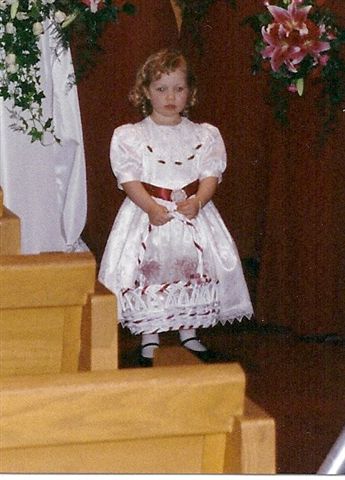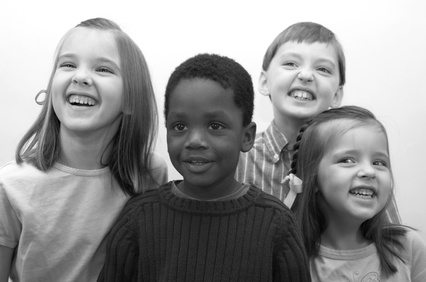Personality, My Daughter & A Wedding
 When my oldest daughter was almost 3-years-old, she played the part of flower girl in a friend’s wedding. She dressed in a beautiful white dress and dropped flowers on the carpet before the bride walked the aisle to marry her husband-to-be. Vows exchanged and pictures taken, we proceeded to the wedding reception. I love wedding receptions—a time of great joy and celebration. Of course, 3-year-olds love them, too. My daughter was dancing, laughing, and having a good time. Soon, the dance floor cleared except for the bride and groom. As the music played, the bride sat on a chair in the middle of the empty dance floor and the groom prepared to remove her garter. Suddenly, a near 3-year-old dressed in a beautiful white dress broke out of the crowd, ran across the dance floor, and tackled the groom. She wrestled him to the ground. The crowds’ laughter slowly turned to stunned murmuring. “Who’s that child’s parent?” I tried to hide, but I couldn’t. Someone had to go get my daughter. Mustering all the dignity I could, and under the watchful eyes of wedding guests and family, I walked across the dance floor to retrieve my daughter. After apologizing, I discovered that the bride and groom really didn’t mind. Apparently, the guests didn’t mind either. They thought it was “cute” and “funny.” But, I have to admit, I was a little embarrassed. Unlike my daughter, I really don’t like being in the center of a large crowd.
When my oldest daughter was almost 3-years-old, she played the part of flower girl in a friend’s wedding. She dressed in a beautiful white dress and dropped flowers on the carpet before the bride walked the aisle to marry her husband-to-be. Vows exchanged and pictures taken, we proceeded to the wedding reception. I love wedding receptions—a time of great joy and celebration. Of course, 3-year-olds love them, too. My daughter was dancing, laughing, and having a good time. Soon, the dance floor cleared except for the bride and groom. As the music played, the bride sat on a chair in the middle of the empty dance floor and the groom prepared to remove her garter. Suddenly, a near 3-year-old dressed in a beautiful white dress broke out of the crowd, ran across the dance floor, and tackled the groom. She wrestled him to the ground. The crowds’ laughter slowly turned to stunned murmuring. “Who’s that child’s parent?” I tried to hide, but I couldn’t. Someone had to go get my daughter. Mustering all the dignity I could, and under the watchful eyes of wedding guests and family, I walked across the dance floor to retrieve my daughter. After apologizing, I discovered that the bride and groom really didn’t mind. Apparently, the guests didn’t mind either. They thought it was “cute” and “funny.” But, I have to admit, I was a little embarrassed. Unlike my daughter, I really don’t like being in the center of a large crowd.“Unlike my daughter”…that’s the point. My daughter and I are different. We have different personalities. My daughter loves to be involved. She loves to be around people and jumps right into activities. She doesn’t mind “putting herself out there.” I admire that about her. I, on the other hand, enjoy one-on-one interactions. I take a while to warm up to an activity; and, I prefer to practice before “performing” for other people. I love my daughter’s personality. It allows her so many opportunities. But, we are different…not just my daughter and I, but everyone in my family. We have different personalities and idiosyncrasies. I tend to get up early. My wife enjoys sleeping. I set my alarm at the softest setting possible. My wife and daughters set their alarm to a deafening roar that causes me to jump out of the bed, grasp my heart, and check to see if I’m still alive.
All these differences remind me of an ancient Hebrew proverb: “train up a child in the way he should go, even when he is old, he will not depart from it.” The word used for “the way he should go” actually means “according to his habits and interests” (McDowell). In other words, as family shepherds we need to know our children’s particular bent, their individual personalities and interests. As we do, our children gain a sense of value and worth in our acceptance of their individual differences. We give them an added sense of security when we nurture and discipline them according to their particular personality. That may mean we discipline each child in a slightly different way while holding them all to the same standard of behavior. One child may comply with a request after getting “the look.” Another child may simply stare back and say “Hi Dad” in response to “the look.” I know because these two options describe my two daughters. Still, my wife and I strive to hold both daughters to the same standard even though one requires a more firm directive as we “train them up…according to their bent.”
 Those differences, the uniqueness of each family member, add to the beauty and strength of family. Where my “natural bent” falls short, my wife’s “natural bent” picks up…and vice versa. My daughters, who don’t mind “putting themselves out there,” and my wife, from whom they inherit that trait, have taught me how to become more involved and social in a group. I am grateful for that. Hopefully, my uniqueness has also taught them something as well. Our differences help us grow and learn. Our differences add to the complex beauty of our families. As family shepherds, we accept the differences of each family member. Even more, we cherish those unique traits as opportunities to promote growth, cooperation, and love.
Those differences, the uniqueness of each family member, add to the beauty and strength of family. Where my “natural bent” falls short, my wife’s “natural bent” picks up…and vice versa. My daughters, who don’t mind “putting themselves out there,” and my wife, from whom they inherit that trait, have taught me how to become more involved and social in a group. I am grateful for that. Hopefully, my uniqueness has also taught them something as well. Our differences help us grow and learn. Our differences add to the complex beauty of our families. As family shepherds, we accept the differences of each family member. Even more, we cherish those unique traits as opportunities to promote growth, cooperation, and love.